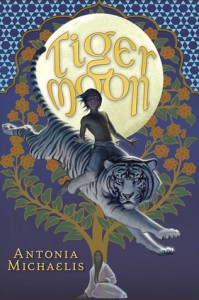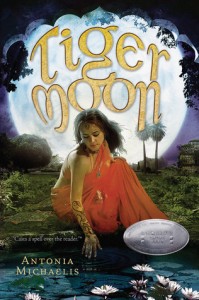Title: Tiger Moon
Author: Antonia Michaelis
Genre: Fantasy, Young Adult, PoC
Publisher: Harry N. Abrams
Publication date: Published in English in 2009
Paperback: 464 pages
This bewitching story within a story, set in magical India, explores the power of narrative to change the course of lives. Raka, the doomed young bride of a violent merchant, weaves a tale of rescue so vivid, it might just come true. She tells a servant boy the story of Farhad, a thief and unlikely hero, who must retrieve a famous jewel in order to save a kidnapped princess from a demon king. Farhad’s unforgettable companion on the journey is a wisecracking white tiger with an unnatural fear of water. It is their unusual and funny friendship, and the final sacrifice that they must make, that is the heart of this grand, beautiful novel about summoning the hero within.
Stand alone or series: Stand alone
How did I get this book: Bought
Why did I read this book: I was looking for Fantasy books with non-western settings and I came across this one on Amazon. It is an ALA award winning book and I thought it sounded great.
Review:
Warning: this review contains spoilers, SmuggleRAGE and Caps Lock of Fury
Trigger warning: rape
Set in magical India, Tiger Moon pays homage to Arabian Nights and Scheherazade by featuring a story within a story. Raka, a young bride married against her will to a powerful merchant who will surely kill her once he discovers she is not a virgin, tells a tale of rescue to a young servant boy (a eunuch, who is not actually a eunuch) called Lalit. She tells the story of another young boy called Farhad, a brilliant thief and reluctant hero who is engaged by the God Krishna to rescue his kidnapped daughter from a demon King. With the help of a talking white tiger, Farhad must cross India in search of an infamous, cursed jewel who will buy the princess’ freedom. Raka hopes that the story of how the reluctant hero Farhad becomes a sacrificing, courageous hero will inspire Lalit to summon the hero within in order to rescue her from certain doom.
At first glance Tiger Moon seems to be an innocuous read for children – it features a talking tiger, a sweeping adventure across the magical country of India with near-deaths, daring escapes and tales of love and hope. Plus a talking tiger whose funny banter with Farhad might just be the one good thing about Tiger Moon. But once you start peeling back its layers and carefully examine the narrative, the topics the story addresses, the meta-text and the way the story wraps up, the result is simply rage-inducing.
I don’t even know where to start: perhaps with the most obvious problem I had with the book. The narrative voice is extremely simplistic and childish. The feeling I had was that this oversimplification had a double objective: to make it accessible to children and to add a fairytale feel to the story. I think it backfired in many ways. I don’t believe in pandering to children and oversimplifying a story tends to lead to generalisations (more on that later) and therefore removing complexity from the story (please note: there is a difference between simple and simplistic. Narrative and writing can be simple and still extremely complex). This also means that the narrative voice was very childish and the characters sound very, very young to the point where I felt I was reading a book about 11 year old characters. Obviously this is not a problem per se, but the characters were much older than that and when they started getting married and having sex, it was extremely jarring as I had pictured them as children. It doesn’t help that for the vast majority of the story, the main characters are addressed as “boy” and “girl”.
That said here is a caveat: the original book was written in German and then translated into English. I don’t know how much of the prose was lost in translation.
But moving on to more important issues.
You will probably have noticed how I italicised the word magical twice so far in this review when in conjunction with “India”. There is an element of exoticising (did I just make this word up?) India that drove me UP THE WALL. Tiger Moon is professed to be a bewitching story set in magical India and from the get go the story is peppered with generalisations, words and descriptions that show how exotic, magical and chaotic India is. Incredibly offensive things like:
“Life is worth so little in India”
“In India, all stories are outlandish”
“Life in itself isn’t valued highly in India”
are presented as truths to the reader. N. K. Jemisin wrote a brilliant article for the blog a few weeks ago addressing this very issue and the following passage exemplifies exactly the problem I had with Tiger Moon:
Calling something exotic emphasizes its distance from the reader. We don’t refer to things as exotic if we think of them as ordinary. We call something exotic if it’s so different that we see no way to emulate it or understand how it came to be. We call someone exotic if we aren’t especially interested in viewing them as people — just as objects representing their culture.
Also worth of mention and on the point: two roundtable articles published this very week at The World SF Blog in which a group of non-westerners authors and bloggers discuss (among other subjects) the issue of “what are the problematics of some Western writers tackling non-Western settings for their novels, and do they result in exoticism?” . These are quite a propos of this review and fascinating. But note: I want to make it clear that I have absolutely nothing against Western authors writing about non-western cultures. But you have got to be way more careful than the generalist, appropriative tone of Tiger Moon.
But back to the review. You know what else? The exoticism of India doesn’t even MAKE SENSE IN THE CONTEXT OF THIS NOVEL. Because the vast majority of this story is being narrated by an Indian girl to an Indian boy. WHY, in the world, would two Indian people be describing India as though they don’t know their own country?
Which brings me to my final point and the climax of the novel. This is where things get REALLY spoilery and SHOUTY. Up until the last 15 pages of this novel, I was offended and angry, already knowing this was going to be a negative review for the reasons stated above.
The final pages of Tiger Moon took it into full-on WALL-BANGER, ENRAGING, I-need-to-find-Picard’s-screencap-now territory.
The book has 448 pages. On page 433, Raka, the main character is SURPRISE! RAPED by her husband. But this is ok because she is rescued immediately after by Lalit, who is now a hero and it all magically disappears as they ride into the horizon together. There is NO reaction, repercussion, mention, NOTHING about the rape. Nothing. It is like it never happened merely ONE SECOND before they take off. It is completely gratuitous and STUPID and demeaning, it serves the story no purpose whatsoever because it has NO IMPACT on the character. It is problematic because it is gratuitous, it is even more problematic because the story and characters never address it. It made me sick.
Not to mention that the whole book ostensibly pays homage to Scheherazade. But in the end, the whole point of the story is to make the BOY become a man in order to rescue the girl and all the talk about being a “hero within” applies only to the BOYS. Obviously. Because GOD FORBID the girl be the heroine of HER OWN STORY. To the point where the hero is described as a MAN in the end because he has grown so much whereas Raka, the main character and narrator of the story who was once described as strong and fearless, remains a girl and diminishes and lets him FINISH HER STORY. How can you pay homage to Scherezade and miss the CRUCIAL POINT of her being THE INSTRUMENT OF HER OWN SALVATION?
I wish I were making this shit up. I have nothing more to say so I will leave you with the words of Captain Picard:
Notable Quotes/ Parts: NO notable quotes but as I was looking for an excerpt online I came across this AWESOME review which you must read.
Rating: 1 – One of the worst books I have ever read; I want my money (and a few hours of my life) back
Reading Next: Grave Mercy by Robin LaFevers
Buy the Book:

















16 Comments
KT Grant
May 16, 2012 at 4:47 amA book must be an epic fail for you when you invoke the Picard picture. 🙁
Vivienne Dacosta
May 16, 2012 at 4:50 amEeep! I won’t read this one. I clicked onto your review as I recently read another book by this author, The Storyteller, which although was slow to begin with was quite heartbreaking. I might avoid this one though.
Liz
May 16, 2012 at 4:57 amI’m horrifically disappointed. I bought this last year in Foyles. It’s been on my shelf unread since then…now though, I’ll toss it into the bin and not even donate it to a charity shop. Don’t want the karma to bite me on the ass. 🙁
KMont
May 16, 2012 at 5:00 amWow. O.O
WOW. I knew it was going to be bad based on your tweets, but…WOW.
I went and looked this one up on Amazon yesterday to see what reviews there said. Say what you will about that place, but I don’t believe ALL reviewers there are fake. This book, however, is mostly praised there. Huh.
I just don’t see how any of what you described can be in any way good.
Ana
May 16, 2012 at 5:05 am@KT Grant – Picard is awesome
@Vivienne – I’ve heard about that book. Doesn’t it also feature a last-minute rape with no consequences?
@ Liz – yes, am throwing my away as well.
@Kmont – I am DISMAYED at the amount of positive reviews. It is also a ALA honor book. This is why I was so happy and excited about finding the review I included in the notable quotes.
AnimeJune
May 16, 2012 at 5:46 amWow, this just sounds awful. Holy shit. I’m already uncomfortable encountering rape in fiction, but a rape that DOESN’T EVEN HAVE A NARRATIVE POINT? A rape that doesn’t have any affect? WHY IS IT IN THE STORY THEN? That’s disgusting.
Makes me want to go and The Orphan’s Tales again because THAT was an awesome version of Scheherezad.
CuriousSue
May 16, 2012 at 5:47 amYour rage does you honor.
If you need something to get the bad taste out of your mouth (because holy shit, 400 pages of TIGER MOON sounds like a lot of punishment), I recommend BRIDGE OF BIRDS by Barry Hughart. It delights me that a middle-class white guy in the 1980s managed to write something so complicated and disrespectful and entirely loving.
“Take a large bowl. Fill it with equal measures of fact, fantasy, history, mythology, science, superstition, logic, and lunacy. Darken the mixture with bitter tears, brighten it with howls of laughter, toss in three thousand years of civilization, bellow kan pei—which means ‘dry cup’—and drink to the dregs.”
“And I will be wise?”
“Better. You will be Chinese.”
Ashley
May 16, 2012 at 6:36 amI abandoned this book early on because something was bothering me, but I couldn’t put my finger on what. Thanks for articulating it. Sounds like it never got better. What a mess!
Iris
May 16, 2012 at 6:39 amI am not sure if exoticising is a word (as a non-native English speaker, how can I ever really know?) but I do use it, and I think it covers the intended meaning really well. Some might replace it by “orientalising”, perhaps?
As for the rest of the points you mentioned in the review, I can see why this must have led to lots of CAPLOCKS OF RAGE. I guess this is a book I’ll be happy to skip reading. I’m so sorry to hear this kind of thing still happens in books.
Marie
May 16, 2012 at 6:41 amThis makes me cringe. I hate that YA books with fairytale nuances could be marketed to my kids. I do NOT want my daughter reading this, or smut like it, and have her come away feeling that RAPE is OKAY because you will be wisked away on a Magic Carpet Ride by a Hero.
Throw up in my mouth a hundred times over.
It is just so not acceptable how something so “unoffending” looking such as the quaint cover of this book could provoke such a devastating effect on my daughter’s thought process towards Rape and Relationships.
Please post your review everywhere.
Linda W
May 16, 2012 at 7:03 amI love this review so much, I wish I could marry it. I had this book on my wish list, thinking it would be something like Catherynne Valente’s The Orphan’s Tales: In the Night Garden, but will delete it promptly. One of my many pet peeves is the use of the word exotic in regard to non-Western cultures. Ugh. And gratuitous rape? No thank you.
KMont
May 16, 2012 at 9:26 amIf they can make “friending” an official word in the American dictionary, I’m sure we could make a case for “exoticising”. Somehow I think it has some real, concrete use. If it’s not already official that is.
Googling it brings up lots of examples of its usage. There, there’s the loophole, if Google can find it, and find it used well, that’s it. It’s official. Google told me so…
nija
May 16, 2012 at 11:44 amGod. What is it with this author and rape? I read “Der Märchenerzähler” (which is tranlated into English as “The Storyteller”) last year. I’ve never been as mad because of a book as I was after reading that book.
[SPOILER WARNING!]
The heroine is raped by her bofriend. After about 40 pages she forgives him and goes back to him.Because “love isn’t sensible”. And suddelnly it’s as if it never had happened. She doen’t have a psychological response, as rape victims normally do. The whole topic is completely trivialized. It’s just used as a device to create more drama.
I can’t believe that this book gets great reviews everywhere. It’s even nominated for the German children’s literature award, which made me speechless when I saw it.
Michelle
May 16, 2012 at 5:53 pmThat Picard photo is all kinds of awesome. You need to do a reread of an old favorite to get the rage out of your system.
Kate
May 17, 2012 at 3:19 pmThat’s really a shame! I would probably have bought it, too, based on the title and cover and that description. It’s great that marketing can polish up a book to make it look better than it is, but… it stinks that marketing can polish up a bad book to make it look like a good one. 🙁
Karina
May 29, 2012 at 4:43 amWow that’s a completely different response to what I had when I read the book – I borrowed it from the library and loved it so much that I bought a copy. I was swept away by the magical fairy tale aspects of it, and didn’t really think about the “exotic otherness” of it that you bought up. Can’t really remember the rape at the end, but I do tend to skim read, especially when I’m enjoying a book and want to get to the end. I’m interested to go back and read this book after seeing your review, to see if my point of view changes.